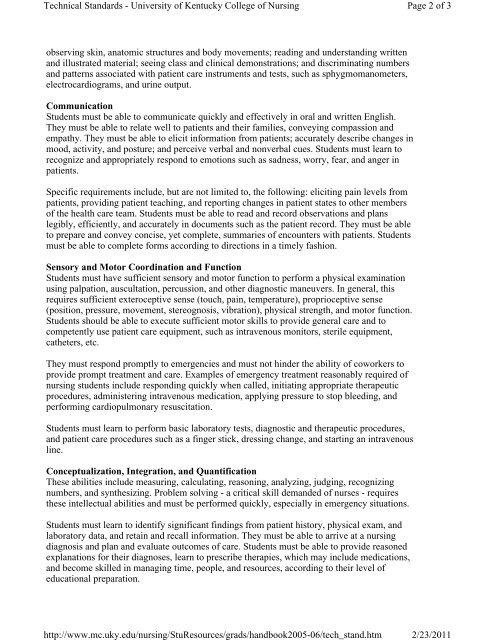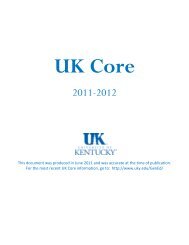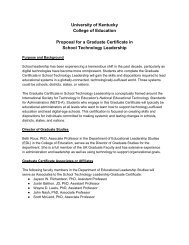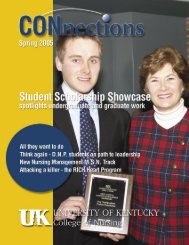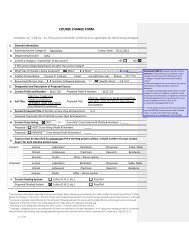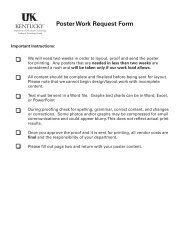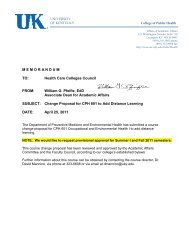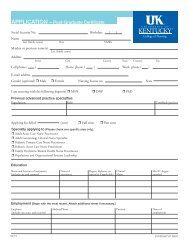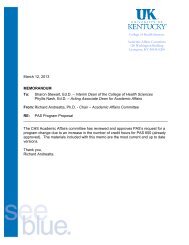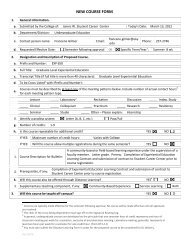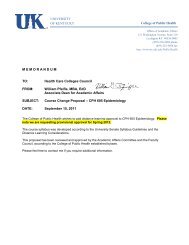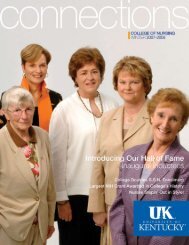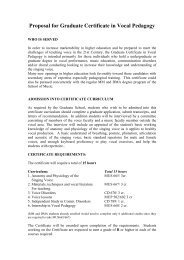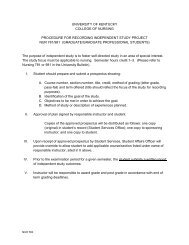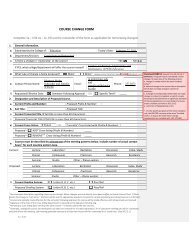05-06 Graduate Student Handbook.pdf - University of Kentucky
05-06 Graduate Student Handbook.pdf - University of Kentucky
05-06 Graduate Student Handbook.pdf - University of Kentucky
Create successful ePaper yourself
Turn your PDF publications into a flip-book with our unique Google optimized e-Paper software.
Technical Standards - <strong>University</strong> <strong>of</strong> <strong>Kentucky</strong> College <strong>of</strong> Nursing<br />
http://www.mc.uky.edu/nursing/StuResources/grads/handbook20<strong>05</strong>-<strong>06</strong>/tech_stand.htm<br />
Page 2 <strong>of</strong> 3<br />
2/23/2011<br />
observing skin, anatomic structures and body movements; reading and understanding written<br />
and illustrated material; seeing class and clinical demonstrations; and discriminating numbers<br />
and patterns associated with patient care instruments and tests, such as sphygmomanometers,<br />
electrocardiograms, and urine output.<br />
Communication<br />
<strong>Student</strong>s must be able to communicate quickly and effectively in oral and written English.<br />
They must be able to relate well to patients and their families, conveying compassion and<br />
empathy. They must be able to elicit information from patients; accurately describe changes in<br />
mood, activity, and posture; and perceive verbal and nonverbal cues. <strong>Student</strong>s must learn to<br />
recognize and appropriately respond to emotions such as sadness, worry, fear, and anger in<br />
patients.<br />
Specific requirements include, but are not limited to, the following: eliciting pain levels from<br />
patients, providing patient teaching, and reporting changes in patient states to other members<br />
<strong>of</strong> the health care team. <strong>Student</strong>s must be able to read and record observations and plans<br />
legibly, efficiently, and accurately in documents such as the patient record. They must be able<br />
to prepare and convey concise, yet complete, summaries <strong>of</strong> encounters with patients. <strong>Student</strong>s<br />
must be able to complete forms according to directions in a timely fashion.<br />
Sensory and Motor Coordination and Function<br />
<strong>Student</strong>s must have sufficient sensory and motor function to perform a physical examination<br />
using palpation, auscultation, percussion, and other diagnostic maneuvers. In general, this<br />
requires sufficient exteroceptive sense (touch, pain, temperature), proprioceptive sense<br />
(position, pressure, movement, stereognosis, vibration), physical strength, and motor function.<br />
<strong>Student</strong>s should be able to execute sufficient motor skills to provide general care and to<br />
competently use patient care equipment, such as intravenous monitors, sterile equipment,<br />
catheters, etc.<br />
They must respond promptly to emergencies and must not hinder the ability <strong>of</strong> coworkers to<br />
provide prompt treatment and care. Examples <strong>of</strong> emergency treatment reasonably required <strong>of</strong><br />
nursing students include responding quickly when called, initiating appropriate therapeutic<br />
procedures, administering intravenous medication, applying pressure to stop bleeding, and<br />
performing cardiopulmonary resuscitation.<br />
<strong>Student</strong>s must learn to perform basic laboratory tests, diagnostic and therapeutic procedures,<br />
and patient care procedures such as a finger stick, dressing change, and starting an intravenous<br />
line.<br />
Conceptualization, Integration, and Quantification<br />
These abilities include measuring, calculating, reasoning, analyzing, judging, recognizing<br />
numbers, and synthesizing. Problem solving - a critical skill demanded <strong>of</strong> nurses - requires<br />
these intellectual abilities and must be performed quickly, especially in emergency situations.<br />
<strong>Student</strong>s must learn to identify significant findings from patient history, physical exam, and<br />
laboratory data, and retain and recall information. They must be able to arrive at a nursing<br />
diagnosis and plan and evaluate outcomes <strong>of</strong> care. <strong>Student</strong>s must be able to provide reasoned<br />
explanations for their diagnoses, learn to prescribe therapies, which may include medications,<br />
and become skilled in managing time, people, and resources, according to their level <strong>of</strong><br />
educational preparation.


